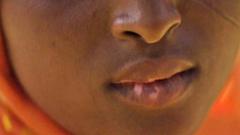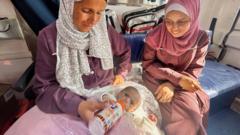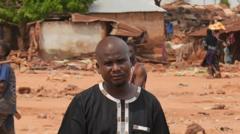A tragic account from northern Nigeria highlights the heartbreaking consequences of skin-lightening practices among mothers, driven by societal bias and cultural conditioning. Fatima, a mother of six, shares her deep regret after using harmful bleaching products on her children, resulting in severe skin damage and social discrimination. Experts warn of the dangers involved, emphasizing the urgent need for awareness and regulation surrounding toxic beauty products.
The Perils of Skin-Lightening: A Mother’s Regret and the Cost of Beauty

The Perils of Skin-Lightening: A Mother’s Regret and the Cost of Beauty
A Nigerian mother reflects on the damaging effects of skin-lightening creams on her children, revealing societal pressures that have led many to alter their skin tone.
A mother in northern Nigeria is struggling with overwhelming regret after using skin-whitening products on her six children. Fatima, a 32-year-old resident of Kano, shared her story while cradling her two-year-old son, who suffers from painful burns and discolored skin as a result of the creams she applied. Pressured by family and societal expectations, she endorsed these harmful practices, leading to serious consequences for her children.
Fatima recalls feeling inferior when comparing her darker-skinned children with her sister's lighter-skinned offspring. In her quest to gain familial acceptance, she bought creams from a local market without seeking medical advice. Though initially it appeared that the products were working, the happiness was short-lived as burns began to appear on her children's skin.
Skin-lightening, also referred to as bleaching in Nigeria, has cultural roots and is a pervasive practice—77% of women in Nigeria reportedly use these products, according to the World Health Organization. This figure is notable, with other African countries experiencing lower rates: 66% in Congo-Brazzaville, 50% in Senegal, and 39% in Ghana. Many creams contain dangerous substances such as corticosteroids and hydroquinone that can cause serious health issues, including skin infections and organ damage.
The severity of the situation prompted Nigeria's National Agency for Food and Drug Administration and Control (Nafdac) to declare a state of emergency in 2023 regarding the sale of these dangerous products. Zainab Bashir Yau, a dermatology spa owner, shared alarming insights indicating up to 80% of women she meets have either bleached their children or are considering doing so. Cultural beliefs that ascribe beauty and wealth to light skin perpetuate this pattern, leading some mothers to expose their infants to these hazardous creams.
In Kano's bustling markets, "mixologists" concoct these skin-whitening creams, often mixing harmful ingredients based on customer demands. Many mothers, unaware of the risks, are inadvertently placing their children's health in jeopardy, seeking to provide their children with what they believe are aesthetic advantages.
Discrimination is another harsh toll on Fatima's daughters, who, because of their altered appearances, face social stigma and are wrongly associated with drug use—a common stereotype linked to skin-lightening. This battle against societal prejudice has affected their self-esteem and personal relationships significantly.
Efforts are being made to combat this issue, including market raids and health education initiatives spearheaded by Nafdac. However, the challenge remains as unregulated and counterfeit products perpetuate a cycle of harm. Fatima now emphasizes the importance of awareness. She hopes her story serves as a cautionary tale to other parents, urging them to steer clear of harmful products and prioritize their children's well-being over societal pressures.
The urgency to confront skin-lightening in Nigeria cannot be overstated, as families weigh the emotional and physical toll of beauty standards on innocent lives. Fatima insists that her experience will haunt her forever if her children's scars do not fade, yet her resolve to educate others offers a glimmer of hope amidst despair.




















